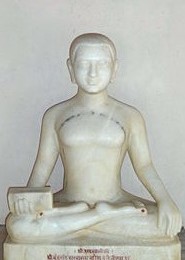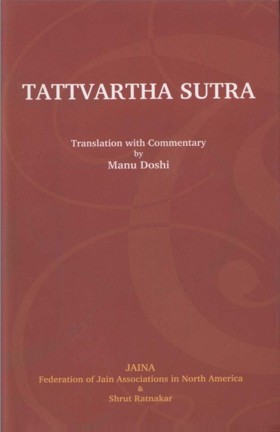09.20 Prāyashchittavinayvaiyavrtyaswādhyāyvyutsar-gadhyānānyuttaram
Audio: Sanskrit: प्रायश्चितविनयवैयावृत्यस्वाध्याय- व्युत्सर्गध्यानान्युतरम्।
Hindi: प्रायश्चित, विनय, वैयावृत्य, स्वाध्याय, व्युत्सर्ग,ध्यान ये आभ्यन्तर तप है।
09.21 Navchaturdashpanchdwibhedam Yathākramam Prāgdhyānāt
Audio: Sanskrit: नवचतुर्दशपञ्चद्विभेदं यथाक्रमं प्राग्ध्यानात्।
Hindi: ध्यान के पूर्ववर्ती आभ्यंतर तपों के क्रमशः नौ, चार, दस, पांच और दो भेद है।
09.22 Ālochanpratikramantadubhayvivekvyutsarga-tapashchhedparihāropasthāpanāni
Audio: Sanskrit: आलोचनप्रतिक्रमणतदुभयविवेकव्युत्सर्गतपश्छेदपरिहारोपस्थापनानि ।
Hindi: आलोचना,प्रतिक्रमण, मिश्र,विवेक, व्युत्सर्ग, तप, छेद, परिहार और उपस्थापन ये 9 प्रायश्चित के भेद है।
09.23: Jnāndarshanchāritropchārāh
Audio: Sanskrit: ज्ञानदर्शनचारित्रोपचाराः ।
Hindi: ज्ञान, दर्शन, चारित्र और उपचार ये विनय के चार भेद है।
09.24 Āchāryopādhyāyatapaswishaikshakglāngan-kulsanghsādhusamanojnānām
Audio: Sanskrit: आचार्योपाध्यायतपस्विशैक्षकग्लान गणकुलसंघसाधुसमनोज्ञानाम्।
Hindi: आचार्य, उपाध्याय, तपस्वी, शैक्ष, ग्लान, गण, कुल, संघ, साधु, और समनोज्ञ ये 10 प्रकार के वैयावृत्य है।
09.25 Vachanāprachchhanānuprekshā"mnāyadharmo-padeshāh
Audio: Sanskrit: वाचनापृच्छनानुप्रेक्षाम्नायधर्मोपदेश
Hindi: वाचना, पृच्छना, अनुप्रेक्षा,आम्नाय और धर्मोपदेश ये स्वाध्याय के 5 भेद है।
09.26 Bāhyābhyantaropadh
Audio: Sanskrit: बाह्याभ्यंतरोपध्योः।
Hindi: बाह्य और आभ्यंतर उपधि का त्याग ये दो व्युत्सर्ग के दो भेद है।
09.20-26
English: Repentance, modesty, service, self-study, renouncing and meditation constitute the internal austerities; the first five are of nine, four, ten, five and two types respectively. The first type consists of Alochan, Pratikraman, Alochan cum Pratikraman, Vivek, Vyutsarga, Tap, Chhed, Parihār and Upasthāpan. The second relates to Jnān, Darshan, Chāritra and Upchar. The third relates to servicing of Achārya, Upādhyāy, Tapaswi, Shaiksha, Glān, Gan, Kul, Sangh and Samanojna. The fourth consists of Vāchanā, Prachchhanā, Anuprekshā, Āmnay and Dharmopadesh. The fifth consists of external and internal renouncing.
The internal austerities are of six types, viz. Prāyashchitta (repentance), Vinay (modesty), Vaiyāvrtya (service), Swādhyāy (self-study), Vyutsarga (staying above bodily and mental concerns) and Dhyān (meditation). The first five of them are of nine, four, ten, five and two categories, respectively. The last one is not covered, because it is to be separately dealt with under 'Dhyān'.
Sutra 22 lays the following nine categories of Prāyashchitta, viz.
a) Ālochan, which means confession of lapses and faults to the preceptor,
b) Pratikraman, which means recalling the lapses with a view to atoning for that,
c) Tadubhay, which means confession cum atonement,
d) Vivek, which means discriminating wisdom,
e) Vyutsarga, which means giving up physical and mental involvement,
f) Tap, which means undertaking of austerities,
g) Chhed, which means reduction in the period of one's initiation in proportion to his faults,
h) Parihār, which means remaining in a sort of quarantine for a period proportionate to the faults and
i) Upasthāpan, which means re-adoption of the vows that were grossly infringed.
Sutra 23 lays following four categories of this austerity, which are based on the subjects of reverence, viz.
a) Jnan, which means knowledge and covers the means thereof,
b) Darshan, which means conviction of the fundamentals,
c) Chāriīra, which means undertaking Sāmāyik, etc. with reverence,
d) Upchār, which means courteous behavior.
Sutra 24 lays following ten categories of this austerity based on the class of persons, who need to be served, viz.
a) Achārya, the head of religious order,
b) Upādhyāys, the masters and teachers of scriptures,
c) Tapaswi, those who undertake acute austerities,
d) Shaiksha, those who are newly initiated,
e) Glān, the sick and weakened,
f) Gan, meaning those belonging to the same group,
g) Kul, meaning those initiated by the same preceptor,
h) Sangh, meaning those belonging to the religious order,
i) Sādhu, the monks and nuns and
j) Samanojna, those having an identical level of knowledge.
a) Vāchanā, taking lessons from the instructor,
b) Prachchhanā, raising questions so as to remove doubts,
c) Anuprekshā, pondering over what has been learnt,
d) Amnāy, which literally means a sect, but has been used here in the sense of repetition of what has been learnt and
e) Dharmopadesh, which means properly presenting what has been leamt
a) Bāhya or external and
b) Abhyantar or internal.
Giving up of physical involvement is termed as external Vyutsarga, while that of mental involvement is termed as internal Vyutsarga.
 Acharya Umaswati
Acharya Umaswati
